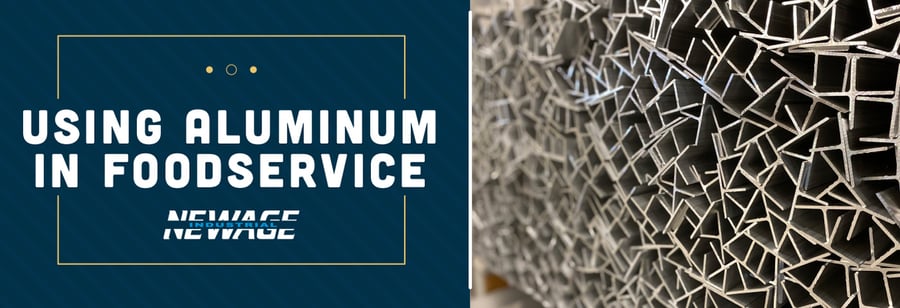
Guest Blog Submitted by Holly Pate at KATOM
Aluminum and stainless steel are popular materials used to manufacture foodservice equipment – but how do you know when aluminum is the right choice for your business? KaTom spoke with New Age Industrial’s vice president of foodservice sales, Cathy O’Shia, to learn more about using aluminum in foodservice. New Age Industrial has been manufacturing aluminum equipment since 1966, and O’Shia has four decades of experience in the industry. With O’Shia’s help, we identified the advantages of aluminum and learned more about how it differs from stainless steel.
Aluminum vs. Stainless Steel
 Aluminum foodservice equipment contains a mixture of alloys that varies among manufacturers. New Age Industrial extrudes its aluminum and has an alloy content consisting of magnesium, silicon, copper, and other materials. Typically, aluminum has little to no iron content, which helps prevent the aluminum from rusting – making this material a durable choice for operators.
Aluminum foodservice equipment contains a mixture of alloys that varies among manufacturers. New Age Industrial extrudes its aluminum and has an alloy content consisting of magnesium, silicon, copper, and other materials. Typically, aluminum has little to no iron content, which helps prevent the aluminum from rusting – making this material a durable choice for operators.
Aluminum products are typically placed in back-of-the-house areas for transportation and storage. Aluminum tends to change color over time while stainless steel will corrode and rust. Stainless steel appliances also wear over time, though they tend to hold their visual quality more than aluminum. Operators tend to place stainless steel equipment in customer-facing areas, as aluminum is more susceptible to scores and marks over time and stainless steel will retain its shine.
Though stainless steel holds its visual quality, the material contains a higher iron content than aluminum; aluminum’s combination of metals won’t corrode.
“The difference is that if you look at any stainless steel, it says iron is the first ingredient,” O’Shia explains. “Iron is going to mix with the atmosphere and is going to corrode, which creates rust.”
When it comes to maintaining equipment, the same cleaners used on stainless steel are typically used on aluminum. According to O’Shia, “Stainless is a little more resistant to the chemicals because it’s chrome-oxide plated.” Though stainless steel is coated, the coating will come off over time and corrode. Aluminum can pit, so operators should ensure chemicals are properly wiped off to prevent deterioration.
Another difference between aluminum and stainless steel is weight. While aluminum is much lighter than stainless steel, it’s just as durable. How much a piece of equipment weighs can affect how much energy foodservice workers must expend to maneuver it, so the lightweight design makes aluminum a great choice for establishments needing to transport items throughout their facility.
Although these products are lightweight, O’Shia says, “New Age Industrial manufactures heavy-duty aluminum that is extruded to withstand the rigors of any foodservice operation.”
Cost is usually a determining factor for operators in search of new equipment. Aluminum can often be a more cost-effective option than high-quality stainless steel, though this can fluctuate depending on the grades used and current supply chain costs. This means that some lower-quality stainless steel products may be less expensive than high-quality aluminum.
In addition to covering the differences between aluminum and stainless steel, O’Shia described scenarios where one material may be better than the other. When it comes to shelving and racks that are placed in walk-in refrigerators, aluminum is better because it’s less susceptible to corrosion; it can be placed in cold and moist environments without ruining the quality of the metal. When stainless steel is placed in refrigerators or freezers, the moist environment can lead to corrosion.
Hotels, bakeries, and other businesses that transport food between locations would benefit from aluminum equipment. Due to its lighter weight, employees can push products longer without experiencing as much fatigue.
However, stainless steel is recommended in front-of-the-house because it retains its shine longer than aluminum. Operators looking to create a modern aesthetic in their customer-facing areas may choose stainless steel over aluminum because aluminum tends to be duller in color.
Establishments utilizing cleaning stations or carts with heavy-duty chemicals may also benefit from stainless steel equipment. Aluminum can pit over time with excessive exposure to concentrated chemicals, while stainless steel can typically better withstand harsh substances.
Common Misconceptions About Aluminum
Because many people associate aluminum with household items – such as soda cans or disposable baking pans – some operators can be hesitant to purchase aluminum equipment for foodservice operations. However, commercial equipment is made from a very different type of aluminum.


“It’s not pop can aluminum,” O’Shia says. “It’s not plane or ship aluminum either, but think closer to that.”
Not only does the right combination of materials matter when making a product, how the equipment is made can also determine product durability. For example, the durability of a mobile aluminum product can be dependent on whether it is made with stem or plate casters. Stem casters, which feature a stem inserted inside the bottom of the unit, have a lower weight capacity than a comparable piece of equipment made with plate casters, which are bolted to the bottom.
O’Shia uses the example of an airline customer to describe how durable aluminum foodservice equipment is. “She buys our big heavy-duty lifetime racks – they’re all fully welded [and] have lasted more than 25 years.”
Making sure to buy a product that’s fully welded and not just riveted helps extend the longevity of the equipment, especially in high-volume operations.
At New Age Industrial, we offer Stress-Free Customization through our Flexible Manufacturing Process. We extrude and fabricate our own aluminum, controlling the entire manufacturing process from start to finish. This allows us to make units wider, narrower, shorter, taller, and more. Our unmatched versatility in product design and in-house team of experts makes New Age Industrial THE Top Choice for storage and transport equipment in the foodservice, supermarket and material handling industries!

